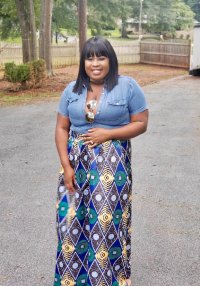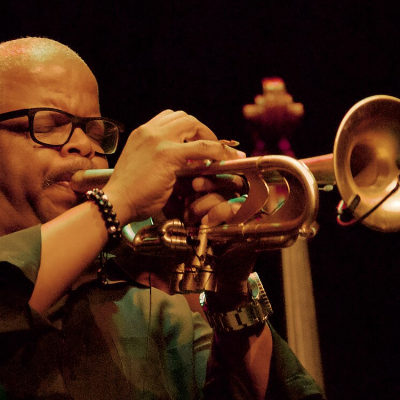“High Notes,” a story by Shan Richardson, was a finalist in our recently concluded 49th Short Fiction Contest. It is published with the permission of the author.
*
High Notes
by Shan Richardson
I drifted off into the best sleep I’ve had in weeks. In months even. It’s been a while since I’ve been able to get into Fat Daddy’s as a regular. It’s the hottest – no, it’s the coolest jazz club there is. On any given night you’d find the club cradled with sweet melodies and rocked by spoken word poetry. And on Friday nights, you used to be able to catch us…
Thing is, my band and I got banned last year. But before then, we had lines out the door with folks wanting to hear us play. The whites, the blacks, the browns and those that fell in between because their parents had jungle fever. The attention can become quite addicting. There wasn’t any fortune though, it’s a small town.
Fast forward to now – a year later. I managed to befriend this big-bellied bouncer.
Last night, he sneaked me up to the attic in the middle of set change. And there I sat, crammed with memorabilia of everyone who’s ever played at Fat Daddy’s as of three years ago: Jerome Jeromi’s pink tie that proved to everyone ain’t nothing gay about a man in pink, the Bougie Boogie’s drum set with the missing cymbals that Tyla’s ex-boyfriend stole, and, the dust-covered trumpet from us, The High Notes. If our band had a mascot, the shiny, regal black and gold trumpet was definitely it. Hashtag Black Lives and Trumpets Matter.
I heard the next group warming up.
Dressed in different shades of black, and I’m talking about their complexion – they take the stage.
I shared my croissant with a few rats that also seem to enjoy Fat Daddy’s. I lighted my joint, listened to the scats and bops from the fair-skinned, freckled young thing named Letta Sai and there it was – high notes. I think I can blow better than her. But if I had to choose anyone to replace me it’d be Letta. She’s not playing tonight so I’ll be taking my French pastries, my lighter and Mary-Jane to an old bandmate’s house.
Music answered a lot of questions for me that people normally couldn’t. I remember my first boyfriend, Jack C. Turner. He was younger than me, but boy did he teach me a lot. Maybe it was his short stature or the three-year age difference – I didn’t start dating until I was 18 – but he was abusive. Told me he was going to treat me the way his daddy treated his ole girl and since they were married for 30 years they must’ve been doing something right. He would hit me but never on Saturdays, as it was his day of rest. I remember asking my Aunt Mattie what’s love. She told me “when he comes home every night.” And Uncle Danny always came home, whether he was drunk, high, happy or mad – he came home. It wasn’t until I heard Auntie Aretha singing about respect one day that I finally had the courage to tell Jack, after his last hit, to “hit the road” himself.
Now my love of doobie, ganja, dank or whatever name you call it is more complicated but also tied up into music. I’ll get there but first I got to get to my bandmate’s place. She tells me she knows how we can start playing at Fat Daddy’s again. I ring the doorbell to Cindy’s house. It’s her parents’ home and I’ve been instructed to go through the back where she is, but they never cut the grass. Besides, back doors are for side chicks and late-night sneak outs.
Cindy answers.
“So, I’ve been thinkin’,” she says as she takes a puff and lets out more smoke than a blown gasket on a ’99 Chevy Impala.
“I’ve been thinkin’ on how we can start playin’ at Fat Daddy’s again… but I forgot…”
It was those two words we found ourselves saying more and more to everyone.
“Did we order that reed for the saxophone?”
“I forgot.”
“Are you going to be able to make it to rehearsals?”
“…I forgot.”
“What day are we playing this week?”
“I forgot.”
Cindy reaches for her trumpet; it’s as if she moves in slow motion. She blows into it but stops to catch her breath. She used to be able to hit these really high notes on the flute and trumpet. Once I added my voice – it was a sound more satisfying than a virgins’ moans. The music, the crowd, the applause. It was all a high. She plays a familiar tune.
It takes me back to the night of my 28th birthday. We finally landed the main act.
“Performing Live: High Notes” it read on the marquee.
I was on the mic. Cindy on the trumpet. Isaac on the drums. And P.T switched between a harmonica and saxophone. After we got banned, they left and started their own group. If Cindy can ever remember the plan to play at Fat Daddy’s again we would have to find two more people for the band. But right now, Cindy’s no help.
I copped a few grams from her. She says it’s an early birthday gift to me. I turn 29 tomorrow.
Music and weed have a lot in common. For me at least. Rather I’m listening to the jazz version of Summer Madness or laying under the dark night sky with my joint, they both seduce me into a calming trance where everything is alright. It seemed rather obvious to combine what I love to hear with what I love to feel. High Notes.
I walk past the club on my way home. I turn back to pay Daddy a visit. Rumor is he fathered half of 15th street, and that’s why they call him “Daddy.” Some say he just looks out for everyone like a dad. The “fat” part is still a mystery I stopped trying to figure out.
“Is Daddy here?” I ask a waitress.
“No.” she answers.
I leave. I know she’s lying. His truck is outside and it’s rehearsal time. Daddy never misses a rehearsal. But, if Daddy didn’t want to hear me out, he was going to have to hear me in. I hurried back to Cindy, even went through the back door as I assumed her parents were back and told her my plan. She agrees.
Tonight, me and Cindy are going to gather on the corner near Fat Daddy’s and play like its Friday. There’s a little amplifier I have from when I used to sing on the corner for money, before we landed the club. It’s pretty loud. Daddy will hear it and he’ll come right out. He hates competition.
My closet was a mess but I already knew what I wanted to wear. My flowy yellow dress that hid enough body but showed enough curves would do the trick. I had to keep my makeup light – you could easily work up a sweat singing outside. If this goes right and we can get enough attention maybe we can play at the club again.
When we were in our prime, we were bringing in thousands of dollars every night. Our last night playing, I was way in the clouds. Cindy wasn’t even there, but it didn’t matter. We knew the time was coming. After one song, Daddy told us not to come back. Ever.
Back to Cindy’s house I go, through the back, with the amplifier and mic in my hand. It’s twenty minutes to showtime. I scheduled everything so we’d be playing at the same time as the opening act. Two knocks to the door with no answer and I decide to call Cindy. No answer. We never discussed where to meet. She may already be by the club, waiting.
It’s ten minutes to showtime. I’m the first to the corner. Cindy calls.
“Hey, you called me?”
“Where are you?” I inquire, knowing the unfortunate truth.
“Home, why?”
“We’re supposed to be playing outside Fat Daddy’s…”
“Oh, that was tonight. I forgot.”
Kind of like it came back full circle. This must have been how Daddy felt dealing with us.
I look too good to just go home but my big-bellied bouncer friend isn’t at the door so it doesn’t look like I’ll be getting into the club. There’s a line wrapped around. It’s longer than I can ever recall. Young couples, businessmen in their business suits and parents happy to get a night out from the kids all stand waiting to get in. I wonder if I can sneak in with the gentleman standing by himself. I can’t. His girlfriend just walked up.
Back home I go with my Mary and a whole playlist of songs I need to learn. I’m planning on singing them whenever we can play at Fat Daddy’s again. I’m still boggled at the long line around Fat Daddy’s, so I ask the group of co-ed friends what’s going on tonight.
“It’s his last night in business,” says one girl.
“And, he’s keeping the show going all night long,” says another.
“Do you want to skip?” asked this clean-shaven guy. He stood there drenched in cologne that made him smell older than he looked.
I decline and walk past the marquee reading:
“Last Night in Business: Open Until 4am.”
__________

Shan Richardson is a 26-year Florida native. Her introduction to writing began at the age of nine when she started writing poetry. She went on to write screenplays and short films while in college. She recently graduated from UCLA School of Theatre Film and Television’s writing program. In addition to writing, in her spare time, Shanice enjoys filming short comedic videos.


































